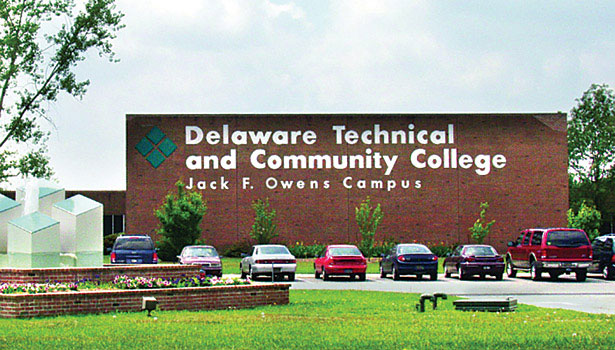Delaware Technical and Community College offers educational opportunities for the community, including career/general development, transfer education, workforce training, and lifelong learning. With over 5,000 students attending the college, life safety is a priority for the 147-acre Owens Campus in Georgetown, which spans 10 different buildings.
In order to maintain a high standard of safety, the college decided to install new fire alarm systems with emergency communications (ECS) and mass notification (MNS) capabilities. Chief Bill Wood, the chief of public safety, was the main decision driver for Delaware Tech’s proposed ECS/MNS updates. At first, Wood only wanted to upgrade the fire alarm system by adding System Sensor horn strobes.
After attending a conference and hearing of Advantech Security’s reputation for campus life safety updates, Wood reached out to general manager Lee Thompson to replace the fire alarms in all university buildings. Advantech began upgrades in the five largest buildings by installing System Sensor strobes and speaker strobes.
“Advantech is a top flight company and a breath of fresh air, and we’ve been very happy with the system. It’s been fault-free. It’s here and doing its thing. We were overjoyed to get a new one,” says Wood.
The System Sensor SpectrAlert Advance SP series of strobes and speaker strobes worked well for this project because the devices offer one of the highest fidelity sound outputs in the market, according to the company. The speaker strobes transmit a clear, intelligible message and provide the necessary visible notification. System Sensor also offers a full line of colored lenses so the devices can also be customized based on a wide variety of emergency events. The evacuation speakers are designed for quick installation and top performance in noisy environments. The low total harmonic distortion of the SP series provides high-fidelity sound output, making them ideal for use in high-ambient noise environments such as universities and campuses.
“System Sensor speaker strobes are easy to install, and the plug-in design is great. The quality is excellent, especially with canned messages,” says Thompson.
In addition to heading the update initiatives and fire alarm design of the strobe system, Wood determined that the ECS/MNS system should be upgraded with voice capability. However, after installing speakers in the common areas, it was discovered that the conference room doors muffled the sound when closed, and that the soft tone of the original voice message didn’t register well from such a long distance. Advantech Security further customized the audibility for the college’s needs and improved the emergency messaging in order to solve the intelligibility problem by adding more devices.
“We wanted to make the speakers loud, but not too loud so the message gets distorted,” explains Thompson. “So our solution was to add more speakers in areas where the message was quiet and increase the tap settings of certain speakers to 2W to ensure audibility. We also worked with the marketing team to create canned voice messages in the event of an emergency. Everything was clear.”
Advantech Security also replaced annunciators with microphones and touch-screen remotes. Five buttons were programmed for speaker strobes and one button for a page-all function. New wire was installed, horn strobes were replaced by speaker strobes, and 26 additional speaker strobes were added throughout the campus.
Due to the number of buildings involved, Advantech elected to use a Gamewell-FCI E3 panel. The E3 Series uses broadband technology as an added benefit, which allows complete system integration over only two wires or fiber optic cables. Overall, 712 System Sensor devices were used over ten buildings. The intent is to adopt this fire alarm/emergency communication system model for the remaining Delaware Technical Community College campuses.
Emergency communications and mass notification systems are more effective than a campus-wide page, especially in the event of an emergency, because of their clear messaging and advanced connectivity. Using the school’s existing telephone system, Advantech used GW-FCI fire telephone modules AOM-TELF to connect the emergency system. Now, authorized users have the capability to dial in on the phone and activate the emergency system from any location.
“When the alarm goes off, it’s audible and grabs your attention so you listen to the message. In Delaware, you have to use an amber strobe if it’s a warning, and it can only flash white for fire. So developing canned messages allowed us to put a new sound in the fire alarm,” Thompson says. “Plus, we can control the sound level because you don’t have to control the variability of someone’s actual voice. The campus also has an interconnected phone system, so we installed a Gamewell-FCI Telco device to connect the fire alarm input to the phone. Now a select few people can call the school and put in a password to talk through the phone and the speakers. That’s a good safety measure because an authorized individual could call and broadcast an emergency message no matter where they are.”





